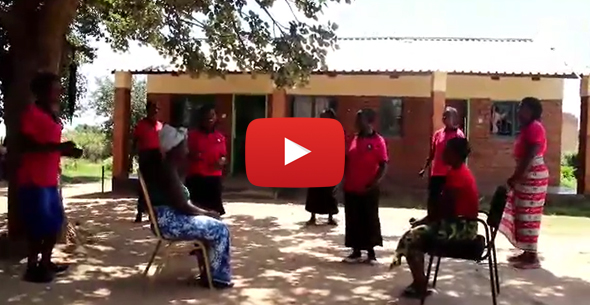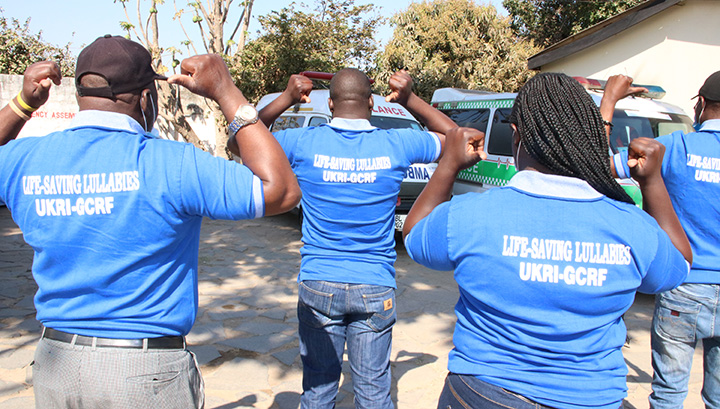Life Saving Lullabies
2020 Good Design Australia Awards
Huddersfield-led ‘Life Saving Lullabies’ project received £130,000 from the Arts and Humanities Research Council and has been working to help women in Zambia. It has now been chosen as the winner of the 2020 ‘Good Design Australia Awards’ in the ‘Social Impact category’.
RESEARCHERS at the University of Huddersfield have earned an international award for their project to use song as a powerful and sustainable way to spread important healthcare information among African women.
Titled Life Saving Lullabies and the recipient of almost £130,000 in funding from the UK’s Arts and Humanities Research Council (AHRC), the scheme is focussed on Zambia, in partnership with a major healthcare provider in that country.
The project was launched in 2019 and now it has been judged as the best entry into the Social Impact category of the 2020 Good Design Australia Awards, which have global prestige.
The University of Huddersfield’s Dr James Reid – an educationalist and one of the project partners – is delighted by the recognition for Life Saving Lullabies, which works by encouraging volunteers to create songs in their local languages that they then perform to women who visit maternity clinics.
Study Education and Community Studies at Huddersfield
In addition to conveying important information about birth and childcare, songs have also proved of value in spreading awareness of COVID-19 precautions. And the scheme is proving to be highly sustainable, said Dr Reid.
“There are a lot of projects in Sub-Saharan Africa that do good work but they require money and infrastructure and on-going support. The big question is, what happens when that money or infrastructure are withdrawn?
“So we were keen to develop something at low or zero cost to assure sustainability,” continued Dr Reid. This was one of the elements that impressed the Good Design Australia judges, he added.
“They recognised that Life Saving Lullabies has the potential to save children’s and mothers’ lives based on singing and that it’s scalable. We can reach hundreds and hundreds of people at little or no financial cost.”
He added that coronavirus had actually helped to emphasise the sustainability of Life Saving Lullabies.
“The pandemic means that we have been unable to pay the visits to Zambia that we had planned. But what we discovered is that we were able to work remotely with our partners on the ground, showing that there was no need for people from overseas going there to achieve the scheme’s goals. There is also a contribution to decarbonisation. These are real positives that speak to sustainability and are another reason we won the award,” said Dr Reid.
In the UK his collaborators on Life Saving Lullabies have been the University of Huddersfield healthcare historian Professor Barry Doyle and design expert Professor David Swann, once a colleague at Huddersfield and now based at Sheffield Hallam University. They are partnered with St John Zambia, a leading healthcare provider.
Life Saving Lullabies was the result of what Dr Reid described as a “eureka moment” when he and his colleagues visited Zambia for a workshop session during 2019, after the country’s President Edgar Lungu declared maternal and prenatal deaths a public health emergency.
Originally, the aim was to investigate whether the Finnish baby box – a maternity package given to all new parents in Finland, contributing to very low levels of infant mortality – could have a role in Sub-Saharan Africa.
But it was quickly realised that this would be too costly and culturally inappropriate for Zambian villages. And when the researchers heard how readily Zambian women used song to describe their lives, they quickly realised that this would be an ideal vehicle for vital healthcare messages.
More Stories
Life-Saving Lullabies to spread COVID warnings
A team of researchers is working with a group of women in Zambia to create songs to warn against the dangers of coronavirus
Nursing in a pandemic: lessons from history
Professor Christine Hallett explores the role of nurses in the Spanish Flu pandemic of 1918-19 and finds parallels with the COVID-19 emergency
Article compares WWII Blitz with COVID conditions
Professor of Health History Barry Doyle was invited to join a group of historians to consider the parallels between the two crises



